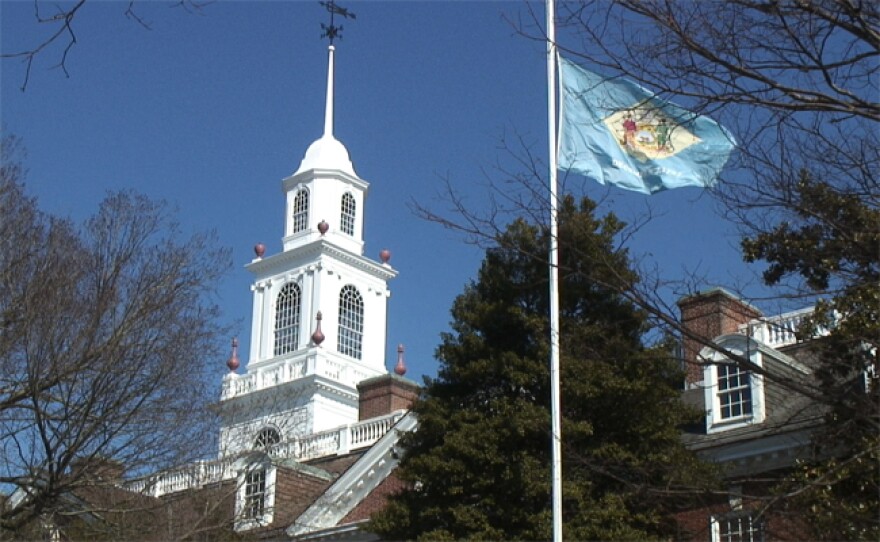The road to funding needed transportation projects in the First State has been filled with its share of potholes. The state’s Transportation Trust Fund lacks needed cash and efforts to replenish it - such has Gov. Markell’s proposed gas tax increase a year ago – have fallen flat. But as Delaware Public Media political reporter James Dawson tells us lawmakers are taking another stab at mapping out a new direction on the issue:
House Democratic Leadership says it’s starting to coalesce around hiking certain DMV fees as part of a plan to raise money to chip away at Delaware’s $780 million backlog of infrastructure repairs and projects.
It’s part of ongoing negotiations that have spanned the past few months involving leaders from both parties in the House and Senate.
House Majority Leader Valerie Longhurst (D-Bear) didn’t specify which fees would increase under the plan, but estimates the move would raise about $28 million a year.
“There’s a lot of DMV fees that haven’t been raised in ten years and Delaware is relatively low on a lot of the DMV fees and it’s minimal to no impact on the consumer on a daily basis.," said Longhurst. "That’s probably the bigger part that we’re looking at.”
That’s more than half of what Longhurst says she’s hoping to put toward infrastructure. The ultimate goal, she says, is to raise $50 million through a variety of options on the table and borrow another $50 million annually for the next five years.
That roadmap closely mirrors what Gov. Jack Markell proposed during his 2014 State of the State address, though lawmakers are still balking at raising Delaware’s consumer gas tax.
Republicans, however, disagree that they’re close to a solution.
House Minority Leader Danny Short (R-Seaford) calls it “premature”, noting that there are still further meetings to go before a plan may be put together.
Short says he’s still pushing to purge the Transportation Trust Fund of DelDOT operating costs.
GOP lawmakers have been calling for the shift for years. Those expenses are expected to total a little more than $155 million next fiscal year.
“Get it out of there, get it in the budget. Let’s talk about how we balance that budget with the true expenses that belong on each side of the ledger," said Short. "We’re fooling ourselves if we don’t try to get that out of there. We’ll never, we’ll never come back to an equitable position unless we move on that.”
Moving that money to the General Fund means legislators just have to pick up the tab in a different budget and cash flowing into the state hasn’t been very healthy for more than a year.
The latest state revenue forecast tracked down again this month, with expected revenues dropping $67 million since Markell proposed his $3.9 billion budget in January.
Democrats say they recognize the need to pull operating costs out of the fund, but haven’t made any push to do so.
Transportation spending dropped noticeably in recent years. It totals about $158 million in the current fiscal year, but only after a hike in some state tolls gave the Bond Bill Committee more money to work with last June.
Markell’s recommended budget for fiscal year 2016 calls for just over $135 million for transportation projects. Spending had hovered closer to $200 million annually before those dips.
Out of the $780 million in delayed road projects, DelDOT says $180 million of it is needed for critical repairs – including on portions of I-95.
Republicans are playing a larger role in negotiations than in prior years since Democrats no longer control the super majority in the Senate to push through tax increases by sheer numbers.
When asked if this could have happened a year or two ago, Short answered definitively.
"It didn’t happen and it didn’t happen because what occurred last year was we were kind of left out of the mix and so if we weren’t in the discussion, we’re not voting on anything,” said Short.
A final solution is still in flux, but all at the table agree on some type of provision that would all but chain any new revenue solely to bankrolling roads projects. Senate Minority Whip Greg Lavelle (R-Sharpley) is looking for a constitutional amendment that would require a three-fifths vote to shift that revenue out of the Transportation Trust Fund, but that would need to be approved in two consecutive General Assemblies, meaning it would go into effect 2017 at the earliest.
A definite timeline is also a point on contention, with Democrats like House Speaker Pete Schwartzkopf leaning toward the near future.
Schwartzkopf says all eyes fall on the operating budget the closer the calendar creeps towards June – especially with revenue forecasts projecting a less than rosy outlook.
“With the numbers looking the way they are it’s going to be pretty difficult to do and I think that if we continue this thing past May into June for the TTF money, I think we lose an opportunity to get our infrastructure fixed,” said Schwartzkopf.
But Republicans say they feel any solution won’t be realized until the final day of the session, June 30.


